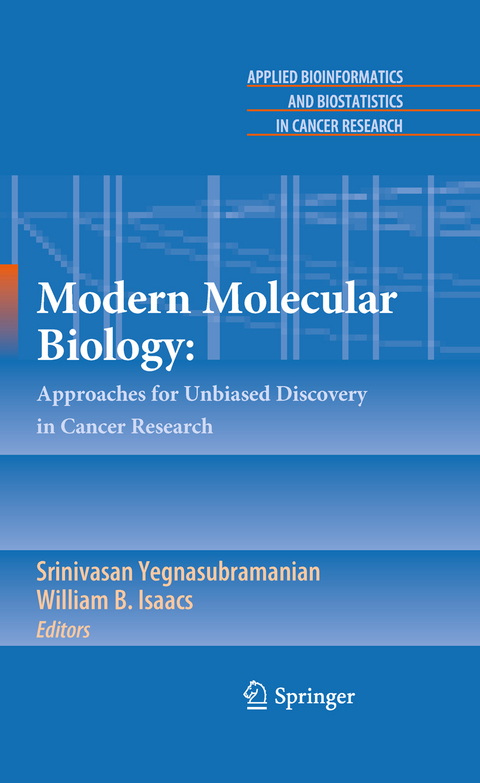
Modern Molecular Biology:
Approaches for Unbiased Discovery in Cancer Research
Seiten
2012
Springer-Verlag New York Inc.
978-1-4614-2657-8 (ISBN)
Springer-Verlag New York Inc.
978-1-4614-2657-8 (ISBN)
This volume provides an overview of modern molecular biological approaches to unbiased discovery in cancer research. It examines advances in molecular biology allowing unbiased analysis of changes in cancer initiation and progression.
Molecular biology has rapidly advanced since the discovery of the basic flow of information in life, from DNA to RNA to proteins. While there are several important and interesting exceptions to this general flow of information, the importance of these biological macromolecules in dictating the phenotypic nature of living creatures in health and disease is paramount. In the last one and a half decades, and particularly after the completion of the Human Genome Project, there has been an explosion of technologies that allow the broad characterization of these macromolecules in physiology, and the perturbations to these macromolecules that occur in diseases such as cancer. In this volume, we will explore the modern approaches used to characterize these macromolecules in an unbiased, systematic way. Such technologies are rapidly advancing our knowledge of the coordinated and complicated changes that occur during carcinogenesis, and are providing vital information that, when correctly interpreted by biostatistical/bioinformatics analyses, can be exploited for the prevention, diagnosis, and treatment of human cancers.
The purpose of this volume is to provide an overview of modern molecular biological approaches to unbiased discovery in cancer research. Advances in molecular biology allowing unbiased analysis of changes in cancer initiation and progression will be overviewed. These include the strategies employed in modern genomics, gene expression analysis, and proteomics.
Molecular biology has rapidly advanced since the discovery of the basic flow of information in life, from DNA to RNA to proteins. While there are several important and interesting exceptions to this general flow of information, the importance of these biological macromolecules in dictating the phenotypic nature of living creatures in health and disease is paramount. In the last one and a half decades, and particularly after the completion of the Human Genome Project, there has been an explosion of technologies that allow the broad characterization of these macromolecules in physiology, and the perturbations to these macromolecules that occur in diseases such as cancer. In this volume, we will explore the modern approaches used to characterize these macromolecules in an unbiased, systematic way. Such technologies are rapidly advancing our knowledge of the coordinated and complicated changes that occur during carcinogenesis, and are providing vital information that, when correctly interpreted by biostatistical/bioinformatics analyses, can be exploited for the prevention, diagnosis, and treatment of human cancers.
The purpose of this volume is to provide an overview of modern molecular biological approaches to unbiased discovery in cancer research. Advances in molecular biology allowing unbiased analysis of changes in cancer initiation and progression will be overviewed. These include the strategies employed in modern genomics, gene expression analysis, and proteomics.
Genome-Scale Analysis of Data from High-Throughput Technologies.- Analysis of Inherited and Acquired Genetic Variation.- Examining DNA–Protein Interactions with Genome-Wide Chromatin Immunoprecipitation Analysis.- Genome-Wide DNA Methylation Analysis in Cancer Research.- Use of Expression Microarrays in Cancer Research.- Signal Sequencing for Gene Expression Profiling.- Mass Spectrometry Based Proteomics in Cancer Research.- Tissue Microarrays in Cancer Research.
| Reihe/Serie | Applied Bioinformatics and Biostatistics in Cancer Research |
|---|---|
| Zusatzinfo | XII, 192 p. |
| Verlagsort | New York, NY |
| Sprache | englisch |
| Maße | 155 x 235 mm |
| Themenwelt | Medizin / Pharmazie ► Medizinische Fachgebiete ► Laboratoriumsmedizin |
| Medizin / Pharmazie ► Medizinische Fachgebiete ► Mikrobiologie / Infektologie / Reisemedizin | |
| Medizin / Pharmazie ► Medizinische Fachgebiete ► Onkologie | |
| Studium ► 2. Studienabschnitt (Klinik) ► Humangenetik | |
| ISBN-10 | 1-4614-2657-X / 146142657X |
| ISBN-13 | 978-1-4614-2657-8 / 9781461426578 |
| Zustand | Neuware |
| Informationen gemäß Produktsicherheitsverordnung (GPSR) | |
| Haben Sie eine Frage zum Produkt? |
Mehr entdecken
aus dem Bereich
aus dem Bereich
Eine sehr persönliche Geschichte | Der New York Times-Bestseller
Buch | Softcover (2023)
Ullstein Taschenbuch Verlag
CHF 30,75
Die revolutionäre Medizin von morgen (Lifespan)
Buch | Softcover (2020)
DuMont Buchverlag
CHF 22,40
Buch | Softcover (2022)
John Wiley & Sons Inc (Verlag)
CHF 169,95


